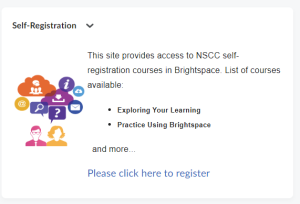Work Experience Process
Preparing for a Work Experience
In many instances, students are responsible for seeking their own work experience, while your faculty supports you throughout the process. In some programs, a work experience may be assigned to you (e.g., a clinical placement).
It is important to note that faculty must approve all job descriptions prior to beginning your work experience.

You are expected to participate in a work experience information session aimed at enhancing your readiness for your job search. These sessions are conducted regularly during the academic year, and a recorded version for your convenience.
Additionally, it is your responsibility to ensure that your resume and cover letter are up to date and prepared for potential employers. Your faculty and the Student Services team on campus are available to provide guidance, and you can also find valuable resources on the NSCC Library website.
Career and Employment Services has developed a comprehensive Brightspace course named Career Jump Start (ESSS-1020). This optional, non-credit course is designed to equip you with essential skills for navigating your career journey. It covers various aspects including career decision-making, job search strategies, effective job application techniques, and maintaining a successful career. The course structure allows you to complete modules in a flexible order and at your convenience throughout your enrollment at NSCC.
To access the course, simply click on the Self-Registration link located on your Brightspace home page and locate the course titled “Career Jump Start (ESSS-1020) and proceed to register.


Once registered, the course will be readily accessible on your Brightspace home page, enabling you to engage with the content at a pace that suits you.
Additional Employer Requirements:
It is important to note that some employers may require specific documentation prior to the start of your work experience. These documents could include:
- Criminal Record Check (CRC),
- Vulnerable Sector Search (VSS),
- Vaccination/Immunization Records,
- Child Abuse Register Checks,
- Driver’s Abstract,
- Security Clearance,
- Drug Testing,
- Medical or Marine Medical; and/or,
- other industry, legislative or regulatory requirements.
It’s important to be aware that if these checks show negative results, it might affect your ability to meet the requirements for your work experience.
Finding a Work Experience:
Depending on your program, your work experience may be either:
- Competitive based (you apply and compete on positions with other students inside and outside NSCC based on the employer’s decision).
- Placement based (you may have input on where and with which community partner you want to do a work experience with but in many cases you are assigned a placement based on NSCC partnerships).
To determine the applicable approach, you are encouraged to consult with your faculty.
The upmost priority is to ensure that every work experience provides valuable learning opportunities and maintains a safe environment for students, therefore, all work experiences must be approved by your faculty or Academic chair to meet these essential standards, prior to your first day.
Self-Directed Searches:
When seeking your own work experience, it is important to take the following criteria into account:
- The work experience job description aligns clearly with your program of study. You should consult with your faculty prior to applying on any position.
- The employer commits to fulfilling their responsibilities as outlined in the NSCC Work Integrated Learning Employer Guide.
- The work site maintains an acceptable level of safety standards as determined by NSCC.
- If you need help finding a work experience, reach out to your faculty or a Student Service Advisor for guidance and support. You can also find additional resources in the Career and Employment section on Connect.
Student and Graduate Employment Site:
Numerous employers frequently post work experience opportunities on NSCC’s Student & Graduate Employment Site, which you are encouraged to monitor regularly for new positions.

Designated Positions:
Co-op Designated:
Some positions may only be open to students enrolled in Co-op. Many employers receive wage subsidy funding and one of the conditions of this funding is that the student must be enrolled in a Co-op Program.
International Students:
Similarly, some positions are restricted to domestics Canadian students as many of the federal funding programs are not open to hire international students.
The Competition Process:
It is the employer/community partner’s discretion on how they wish to carry out competitions. Some employers may screen students based on a number of factors beyond the influence or control of NSCC. Most employers, will however, conduct an interview process with multiple applicants. Just because you apply on a position, does not guarantee you will be invited to interview for the position.
Interviews:
Employers have the option to initiate contact to arrange an interview at their convenience. Interviews can be conducted in-person, at the workplace, over the phone, or through suitable technological platforms.
To enhance your interview readiness, you may receive interview preparation guidance from your faculty and/or our communications course. Additionally, you have the opportunity to refine your skills through the NSCC Library Writing Centre or with the support of your Student Service Advisor.
For enhanced interview preparation, we recommend utilizing InterviewPrep, an innovative online platform designed for mock interview preparation materials, offering a wide array of over 5000 practice questions. Additionally, this platform offers insightful feedback aimed at refining your interview skills.
Below are some helpful tips in preparing for an interview:
- Research the company to grasp its values and goals
- Review your resume and be ready to discuss your experience and skills
- Practice answering common interview questions to boost confidence (InterviewPrep Link)
- Prepare insightful questions for the interviewer to demonstrate your interest in the role
- Dress appropriately and maintain positive body language
- Arrive a bit early to create a strong initial impression
- Send a thank your email after the interview to show appreciation
Accepting a Work Experience Offer:
The employer may contact your faculty to extend an offer, or they may contact you directly. You must obtain faculty approval prior to accepting any offers.
You are required to respond to work experience offers within two (2) business days. Do not tentatively accept an offer while waiting to find out about another position. Such actions could raise doubts about your responsibility and maturity, and even lead to an employer withdrawing from the work experience program.
During Your Work Experience:
As the College considers work experience as an integral part of your academic journey, you are expected to maintain regular communication with your faculty throughout the process. Effective communication is fundamental to a successful work experience.
Active participation in your Brightspace coursework during your work experience is essential. The course could include content you are required to review, assignments and/or reflective activities such as discussion posts that are part of your evaluation.
Your faculty will arrange periodic check-ins with both you and your employer to oversee job safety and performance. The frequency of these check-ins will be determined by your faculty and may be conducted either digitally, virtually, or in-person, depending on the circumstances and location of your work experience. These check-in discussions will encompass a range of factors, including your interpersonal relationships, reliability, learning aptitude, attitude, decisions making, professionalism, attendance, punctuality, overall work achievements, and areas for enhancement.
It is imperative that you contact your faculty immediately and not wait until a formal check-in if any of the following circumstances occur:
- Modifications to your work assignments that would significantly change the nature of your work compared to the approved job description.
- If your position ends unexpectedly, prior to your stated end date. This includes:
- Being terminated with cause
- Being terminated without cause
- Layoff
- Illness requiring extended time away from a position.
- A strike or labour dispute.
- A public health or community emergency requiring stoppage of work, evacuation or any other public health advisory.
- An accident/Incident:
- An occurrence, condition, or situation arising in the course of work that resulted in or could have resulted
in injuries, illnesses, damage to health, or fatalities
- An occurrence, condition, or situation arising in the course of work that resulted in or could have resulted
- Stressful situations that cause undue risk to your mental/emotional well-being
Orientation:
On your first day of the work experience, the Employer is responsible to provide you with an orientation. This orientation will help you set up distinct goals, tasks, and duties for your work experience. It will also give you the chance to become familiar with your work environment, whether it’s on site or remote, and gain an understanding of the organization.
Job Safety Review:
Another crucial aspect covered during your orientation is job safety. This is the time when you’ll receive information about your employer’s Occupational Health & Safety Policies, layout of the worksite, job hazards etc. to ensure you are aware of safe work procedures.
Confidentiality:
Maintaining confidentiality is crucial to upholding privacy, security, and trust in both professional and personal interactions. Whenever sensitive information is involved or accessible, maintaining confidentiality is an absolute necessity. Throughout your work experience, you’ll be expected to uphold the confidentiality of all details concerning clients, policies, and work materials that you come across or have access to. Sharing general information with your faculty related to your work experience will be permissible and necessary for academic purposes.
Release of Information:
Throughout your work experience, there will be a need for communication between your faculty and employer concerning your performance. In alignment with the Freedom of Information and Protection of Privacy Act (FOIPOP) and the Personal Information Protection and Electronic Documents Act (PIPEDA), there might be a necessity to share communication and information with your employer. This is essential for the purpose of obtaining credit for your course.
Evaluation of Work Experience
Your faculty will evaluate your performance throughout your work experience, and the resulting grade will be reflected on your transcript as either a “P” (pass), “F” (fail) or “I” (incomplete). It is mandatory for your employer to provide feedback on your performance upon completion of the work experience. It is also required for you to submit feedback on your employer. To gain a deeper understanding of the evaluation process, please refer to your Brightspace course.
NSCC’s Work-Integrated Learning & Co-op Student of the Year Awards
Each year, NSCC recognizes exceptional students through the “Co-op Student of the Year” and “WIL Student of the Year” awards. If you or your employer wish to nominate you for these awards, you must initiate the application process via NSCC’s Student Awards portal. During the application, your faculty and employer will be requested to support your candidacy by outlining the positive impact you made on the College and/or their organization during your work experience.
A dedicated committee will review the applications, and the award recipients will be honoured at their campus awards ceremony in June. With consent from the winners, they will also be nominated for the prestigious CEWIL Canada Student of the Year Award. These nominations must be submitted to CEWIL Canada office in January of each year. Winning students will be granted $1,000, comprising a CEWIL Canada award of $500 and the Emery-Dufault award of $500. For more information on this award, visit CEWIL Canada.


